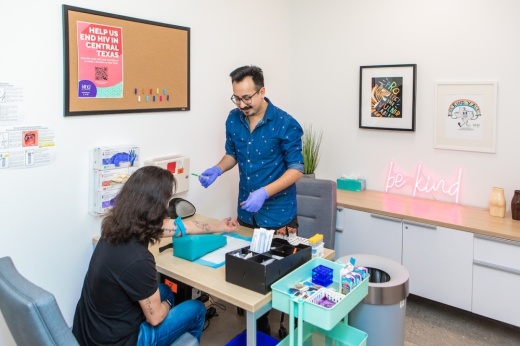Austin Public Health officials are also dealing with a similar trend, and individuals are encouraged to seek out testing and resources regardless of sexual orientation or gender. Some of these resources include the sexual health clinic, 15 Waller St., Austin; and the Kind clinics, 2800 S. I-35 Frontage Road, Ste. 103, Austin, and 101 W. Koenig Ln., Ste. 100, Austin.
In total, both clinics combined saw more than 20,000 patient visits for STIs in 2022.
“Our sexual health programs are critical to the health and well-being of our community, and we are committed to providing equitable access to resources that promote sexual health and wellness for all residents of Travis County,” APH Director Adrienne Sturrup said.
APH officials saw 10,000 patient visits—up 38% from the 2021 numbers, Sturrup said. The Kind Clinic, which is a full-service, free sexual health and wellness clinic dedicated to the treatment and prevention of STIs, saw a similar trend for 2022, providing services to 11,260 patients through the walk-in clinic on Koenig Lane.
“This is an increase of 365% in demand for STI testing,” said Steven Tamayo, director of Community Health for Texas Health Action, which oversees the Kind clinics. “I think we can attribute this increase somewhat to people coming out of quarantine, restrictions being lifted, people getting back to going out—anecdotally, this is what we have seen.”
APH's sexual health programs offer a range of services, including testing and treatment for STIs; human immunodeficiency virus, or HIV, testing and counseling; and education on safe sexual practices. The program also provides free condoms and distributes them to various community locations.
The Kind Clinic offers similar services, and specializes in STI and HIV testing and treatment with expertise in serving the LGBTQIA+ community, Tamayo said. In addition, the clinic offers a mobile unit that travels throughout the city for those who do not have transportation.
“June is our busiest month as it is pride month,” Tamayo said. “For those who want to know where we are, we recommend following us on social media.”
Tamayo said another service offered by the clinics includes mpox vaccines for the public.
“In February, the city received a half-million-dollar grant for these vaccines,” Tamayo said. “As a result, we are offering pop-up vaccine clinics during the weekdays through the mobile testing vans. We also offer vaccines by appointment at the clinic.”
Tamayo said a lot of local staff learned how to administer vaccines through training, making the clinic capable of serving more patients.
“These vaccines are important as officials see a possibility of another outbreak during the summer months,” Tamayo said. “To help prevent that, officials are trying to reach as many people as possible now.”
Austin residents are encouraged to take advantage of the resources provided by these clinics to protect their sexual health and prevent the spread of HIV and other STIs.
“Everyone should know their sexual health status,” said Cassandra DeLeon, assistant director of the APH Disease Prevention Health Promotion Division. “The sexual health team provides patients with information and clinical support to meet their needs.”
For more information about the APH clinic, call 512-972-5430. For more information about the Kind Clinic, call 1-833-937-5463.





